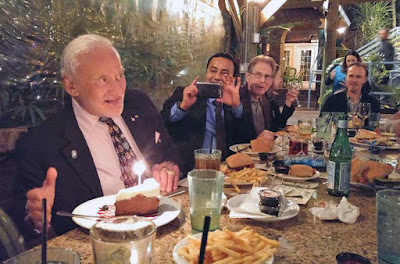It's not often that
a simple question stops me in my tracks and makes me really think. "What are some things you have liked from your experiences so far?" I
have had varied experiences over the years, many good, some not so
good, some extraordinarily fantastic. What stands out in my mind?
In my previous job,
I found it exhilarating to be part of a new space venture. The goal
was exciting and new. I loved getting in at the beginning and being
able to influence the direction and make things happen. I enjoyed
being part of the larger conversation with people who make a
difference at the Commercial Spaceflight Federation members meeting.
I got a kick out of the uniqueness of attending a Swiss Embassy
party. I felt like I had a purpose when I was bringing people
together to assist in getting a new space vehicle off the ground and
experiments and passengers within it.
In my job before
that, I found satisfaction in being part of something bigger than
myself, the International Space Station. I enjoyed being exposed to a
diversity of science and engineering experiments ranging from
research I was familiar with to research I had never imagined before.
I felt comraderie in reaching out to scientists to understand their
fundamental questions and assist them in attempting to answer them in
space.
In another job, I
loved examining the space industry as a whole and understanding how
everything is interconnected. In another job, I loved the hands-on
science experimentation that I was able to perform, including two
microgravity campaigns in parabolic aircraft. I was also privileged
to undergo centrifuge and altitude chamber training to simulate
suborbital space. Although I was miserable camping, I enjoyed
climbing down a meteor crater with an astronaut as our guide. In
leading space-related organizations, I loved bringing people together
and accomplishing things that bring others enjoyment. From my very
first job in the field, I was excited to be doing real science!
Nothing beats
watching the flames light beneath a vehicle heading toward the stars,
or at least to the Karman line, and hearing the roar as it goes. I've
watched a Mars rover testing and a future space observatory just
being built. I've touched space hardware and I've longed to travel
with it. I've held dust from another world. I've been on teams
dreaming up Moon bases and Mars bases and various ways for humanity
to travel beyond.
On the interpersonal
side, this extrovert gets a thrill from discussing plans and ideas
with colleagues and strangers alike. Presentations at conferences can
be stimulating and the travel is fun, but I really prefer one-on-one
or small group conversations where ideas flow. I enjoy meeting
lawmakers and associated movers and shakers and articulating why
space is such an important topic to me, to them, and to the country.
I enjoy meeting strangers at a party or on an airplane and conveying
to them why they should care. I especially enjoy speaking to students
of all ages but especially older students who can ask great questions
and convey their own enthusiasm for the subject. Inspiration is
everywhere.
What do my favorite
experiences have in common? Purpose and community. If I can find a
true purpose in what I'm doing and belong to a community of
like-minded people working with me to achieve it, I'm happy. And of
course, lots of fun!
 |
| Astronaut Laura ready to leap - July 2007 |






